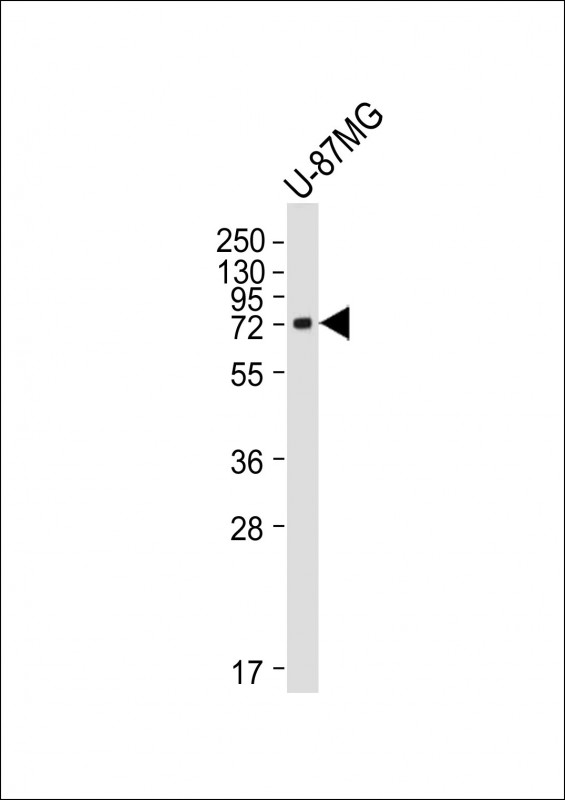
| WB | 咨询技术 | Human,Mouse,Rat |
| IF | 咨询技术 | Human,Mouse,Rat |
| IHC | 咨询技术 | Human,Mouse,Rat |
| ICC | 技术咨询 | Human,Mouse,Rat |
| FCM | 咨询技术 | Human,Mouse,Rat |
| Elisa | 咨询技术 | Human,Mouse,Rat |
| Aliases | Prostaglandin G/H synthase 2, 1.14.99.1, Cyclooxygenase-2, COX-2, PHS II, Prostaglandin H2 synthase 2, PGH synthase 2, PGHS-2, Prostaglandin-endoperoxide synthase 2, PTGS2, COX2 |
| Entrez GeneID | 5743 |
| WB Predicted band size | 69.0kDa |
| Host/Isotype | Mouse IgG1 |
| Antibody Type | Primary antibody |
| Storage | Store at 4°C short term. Aliquot and store at -20°C long term. Avoid freeze/thaw cycles. |
| Species Reactivity | Human |
| Immunogen | This PTGS2 antibody is generated from a mouse immunized with a recombiant protein from the human region of human PTGS2. |
+ +
以下是关于PTGS2(COX-2)抗体的3篇代表性文献摘要:
---
1. **文献名称**:*Differential expression of cyclooxygenase-2 (COX-2) in human colorectal cancer*
**作者**:Kargman, S. et al.
**摘要**:该研究通过免疫组化技术,使用特异性PTGS2抗体检测结直肠癌组织中COX-2蛋白的表达,发现COX-2在肿瘤组织中的表达显著高于正常组织,提示其与肿瘤发生发展的关联。
---
2. **文献名称**:*Characterization of COX-2 antibodies for western blotting and immunohistochemistry*
**作者**:Choi, S.H. et al.
**摘要**:研究评估了多种商业PTGS2抗体的特异性,发现部分抗体存在交叉反应性(如与COX-1结合),强调选择高特异性抗体对实验可靠性的重要性,并推荐了验证方法。
---
3. **文献名称**:*COX-2 expression in Alzheimer’s disease and neuroinflammation*
**作者**:Bauer, M.K. et al.
**摘要**:通过Western blot和免疫荧光技术分析PTGS2在小胶质细胞中的表达,发现其与神经炎症相关,为阿尔茨海默病中炎症通路的机制研究提供依据。
---
(可选第4篇)
4. **文献名称**:*Regulation of COX-2 by cytokines in human fibroblasts*
**作者**:Yucel-Lindberg, T. et al.
**摘要**:研究利用PTGS2抗体检测IL-1β刺激下成纤维细胞中COX-2的蛋白水平变化,证实炎症因子通过NF-κB通路显著上调COX-2表达。
---
以上文献覆盖PTGS2抗体在癌症、神经疾病及炎症机制研究中的应用,需根据具体实验目的选择合适抗体并验证特异性。
PTGS2 (prostaglandin-endoperoxide synthase 2), also known as cyclooxygenase-2 (COX-2), is an inducible enzyme that plays a key role in inflammation, pain response, and cellular proliferation. Unlike its constitutive isoform PTGS1 (COX-1), PTGS2 is not typically expressed in most normal tissues but is upregulated during inflammatory processes, infections, or tumorigenesis. It catalyzes the conversion of arachidonic acid to prostaglandin H2. a precursor for various pro-inflammatory mediators. Due to its association with diseases like arthritis, cancer, and cardiovascular disorders, PTGS2 has become a major therapeutic target, with inhibitors like celecoxib widely used in clinical settings.
PTGS2 antibodies are essential tools for detecting and quantifying PTGS2 protein expression in research and diagnostics. These antibodies enable the study of PTGS2's regulatory mechanisms, cellular localization (primarily in the endoplasmic and nuclear membranes), and its role in pathological conditions. They are widely used in techniques such as Western blotting, immunohistochemistry (IHC), and immunofluorescence to investigate PTGS2 overexpression in inflammatory tissues or tumors. Specificity validation through knockout controls or siRNA silencing is critical, as cross-reactivity with PTGS1 remains a common concern. Clinically, PTGS2 antibodies aid in biomarker analysis for cancer prognosis and evaluating therapeutic responses to COX-2 inhibitors. Their development continues to support advances in understanding inflammation-driven diseases and targeted drug discovery.
×